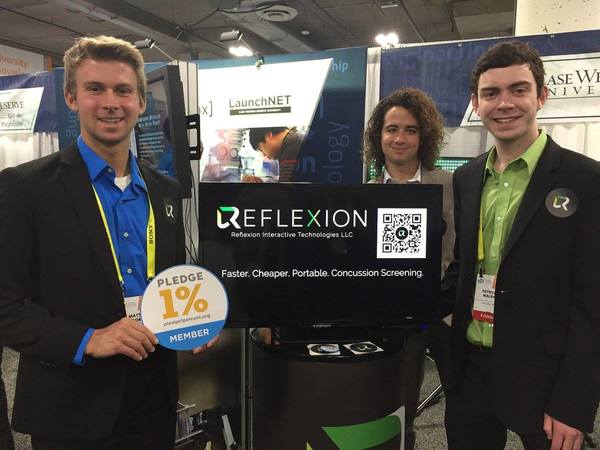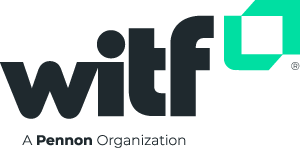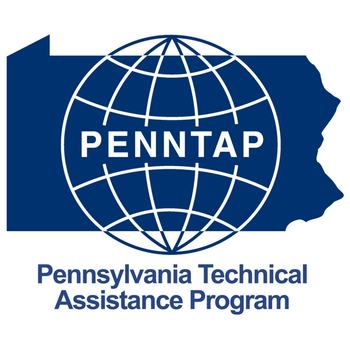The Reflexion Edge – portable concussion screening

The Reflexion Edge being shown at the 2017 Consumer Electronics Show (L to R: Matt Roda, Matt Campagna, and Patrick Walsh)
Matt Roda loved playing hockey. He didn’t know the sport would change his life. It happened his junior year in high school, right at the start of the game.
“I got the puck and was on a breakaway, got around the defender, but immediately was hit from behind.”
He fell and slid full speed into the boards. Matt’s coach worried about a concussion.
“He brought me to the bench and asked, where are you? what year is it? who’s the president?”
Answering all three questions correctly, he was allowed back on the ice. Matt doesn’t remember the rest of the game, or the drive home afterward.
Days of persistent headaches after the incident drove Matt to see a doctor where he was diagnosed with a severe concussion. The recommended treatment was to sit in a dark room and rest. Two weeks later, he didn’t feel any better. The headaches continued. Matt began feeling depressed and anxious. The effects of the concussion would cause him to miss the next two months of school.
“What was so frustrating was not knowing when I would actually be able to be my normal self again.”
Eventually Matt recovered enough to return to his classes.  Experiencing it all first hand, Matt felt there was a lot of room for improvement in the concussion testing and recovery process. That’s when he and two friends — Matt Campagna and Patrick Walsh – started researching concussion protocol and questioning medical professionals. They hoped to find a more accurate and faster way to detect and treat concussions and brain injuries. With support from their high school, the boys established a startup company called Reflexion. The name being a play on the word reflex.
Working in Matt’s basement, the three created a portable device called The Edge.  Standing in front of a six-foot panel, subjects touch lights that appear at random. They take the test every week to establish a more comprehensive picture of the athlete’s brain function over the course of a season. The Edge measures eye-hand coordination, reaction time, and peripheral vision, so if a person does get a concussion, it will show in the test results.
Matt and his friends have since graduated high school and are now in college, but they continue to improve and market the Reflexion Edge. Matt attributes a lot of the company’s progress to the advice and mentoring he’s received at Penn State University.
“I really don’t know how to run a business. For them to be able to provide strategic advice and answer questions I’ve never even thought of… that’s been a huge help for us.”
Penn State University programs like PennTap and Happy Valley LaunchBox have helped the Reflexion team with obtaining patents, creating business models and sales strategies. Matt’s particularly grateful for the invaluable research and funding contacts he’s found through the Penn State Alumni Association.
Today the Reflexion Edge is going through third-party clinical trials. Matt hopes to launch the product this summer and have the Edge device in high schools within a year.Â
“This has consumed my life in a way I never really expected. I hope to make an impact on the world, help athletes, and prevent stories like mine from happening again.”
Transcript:
A few years ago, Matt Roda was playing hockey. He was hit from behind, fell and slid headfirst into the boards. The coach checked him for a concussion.
Matt was allowed back on the ice. He doesn’t remember the rest of the game. He had a severe concussion. He would miss weeks of school and suffer frequent, painful migraines. Recovery would be slow.
Matt and his friends began looking for a better way to affordably and accurately test for concussions. The result was a 6-foot touchscreen called the Reflexion Edge.Â
Matt Roda:Â It’s actually just fun engaging test that can quantify and objectively measure brain function and even improve it.
Today, Matt is at Penn State University, growing his business through mentoring offered through programs like the Happy Valley LaunchBox and PennTAP.
A classroom competition prompted her to invent a speech recognition device, something she hoped would help people like her friends in South America. Â
Matt Roda:Â I really don’t know how to run a business but for them to be able to provide that strategic advice and answer questions I’ve never even thought of, that’s been a huge help for us.
In the future, Matt wants the Edge to help people with debilitating conditions like Alzheimer’s and Parkinson’s. Â
Matt Roda:Â So being able to provide more than just a concussion test is what really makes us different.
Find more information about Reflexion Interactive Technologies at http://www.reflexioninteractive.com/Â
PennTAPÂ helps organizations maximize their competitiveness through consultations, technical advice, and connections to Penn State experts and resources.
Learn more about the Pennsylvania Technical Assistance Program (PennTAP) at https://penntap.psu.edu/
Happy Valley LaunchBox programs are open to everyone (community members, Penn State students, faculty, and staff). Founded in February of 2016, LaunchBox is a signature program of Invent Penn State, a Commonwealth-wide initiative to spur economic development, job creation, and student career success. Happy Valley LaunchBox is one of 17 innovation hubs across the Commonwealth. Their mission is to be the “hub” that connects local entrepreneurs to the support, resources, and facilities they need to build a sustainable and scalable business with a viable plan for growth.
By centralizing no-cost services, they help entrepreneurs to avoid the common mistakes startups often face and enable them to focus their time on de-risking and growing their businesses.
Learn more about Penn State University’s Happy Valley LaunchBox at http://launchbox.psu.edu/
Support for Innovation U comes from PNC.
Innovation U is a project from WITF, where we share stories of entrepreneurs and Pennsylvania universities who are working together to make new ideas come to life. Learn more at witf.org/innovation






